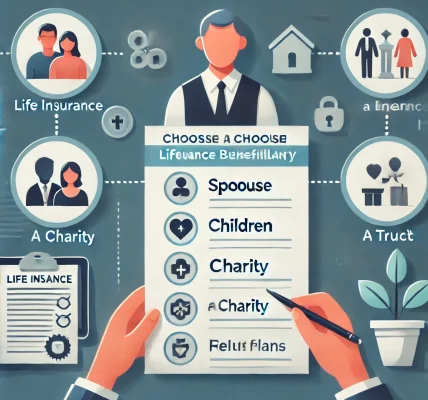Introduction
Many people confuse life insurance and health insurance or assume they only need one type of coverage. However, both serve distinct purposes and are essential for financial security. Life insurance provides financial protection for your family in case of your untimely death, while health insurance covers medical expenses and healthcare costs during your lifetime.
In this guide, we’ll explore the key differences between life insurance and health insurance, why they are both crucial, and how they work together to ensure complete financial protection.
Understanding Life Insurance
What is Life Insurance?
Life insurance is a contract between an individual and an insurance company, where the insurer agrees to pay a lump sum (death benefit) to the designated beneficiaries upon the policyholder’s death. In return, the policyholder pays regular premiums.
Types of Life Insurance:
- Term Life Insurance: Provides coverage for a specified term (10, 20, or 30 years). If the policyholder dies within the term, the beneficiaries receive the payout.
- Whole Life Insurance: Offers lifelong coverage and accumulates cash value over time.
- Universal Life Insurance: Similar to whole life but with more flexibility in premiums and death benefits.
- Final Expense Insurance: Covers funeral and burial costs, ensuring families are not burdened with these expenses.
Key Benefits of Life Insurance:
- Provides financial security to dependents.
- Pays off debts, including mortgages and loans.
- Covers funeral and estate settlement costs.
- Acts as an investment tool (in the case of whole life and universal life policies).
Understanding Health Insurance
What is Health Insurance?
Health insurance is a policy that covers medical expenses, including hospitalization, doctor visits, prescription drugs, and preventive care. It protects individuals and families from the high costs of medical treatments.
Types of Health Insurance:
- Individual Health Insurance: Purchased by an individual for personal healthcare needs.
- Group Health Insurance: Provided by employers for employees as a workplace benefit.
- Family Health Insurance: Covers multiple members under a single plan.
- Critical Illness Insurance: Provides a lump sum payout upon diagnosis of severe illnesses like cancer, heart attack, or stroke.
- Medicare/Medicaid: Government-sponsored health insurance programs for senior citizens and low-income individuals.
Key Benefits of Health Insurance:
- Covers hospitalization, surgeries, and emergency medical expenses.
- Reduces out-of-pocket healthcare costs.
- Provides access to preventive care, including vaccinations and screenings.
- Protects against high costs of chronic disease management.
Key Differences Between Life Insurance and Health Insurance
| Feature | Life Insurance | Health Insurance |
|---|---|---|
| Purpose | Provides financial security after death | Covers medical expenses while alive |
| Beneficiaries | Family members or dependents | Policyholder and covered family members |
| Payout Type | Lump sum upon death | Ongoing medical expense coverage |
| Duration | Can be term-based or lifelong | Renewed annually or as per policy term |
| Cash Value | Some policies accumulate cash value | No cash value, only covers expenses |
| Legal Requirement | Not mandatory | Often required (especially employer-based) |
Why You Need Both Life and Health Insurance
Many people believe that having one type of insurance is enough. However, to ensure complete financial protection, it is essential to have both. Here’s why:
1. Health Insurance Protects Your Present, Life Insurance Secures Your Future
- Health insurance ensures you have access to medical care without draining your savings.
- Life insurance guarantees that your loved ones are financially stable even after your passing.
2. Preventing Financial Burden on Your Family
- Without health insurance, sudden medical expenses can lead to significant debt.
- Without life insurance, your family may struggle financially in your absence.
3. Tax Benefits of Having Both Policies
- Health insurance premiums may be tax-deductible.
- Life insurance proceeds are generally tax-free for beneficiaries.
4. Better Financial Planning and Peace of Mind
- Combining both policies ensures you are prepared for medical emergencies while also securing your family’s future.
How to Choose the Right Policies
For Life Insurance:
- Assess your financial obligations (loans, mortgage, children’s education, etc.).
- Determine the coverage amount based on your income and dependents’ needs.
- Choose term life if you want affordable coverage or whole life if you seek investment benefits.
For Health Insurance:
- Look for a plan that covers hospitalization, doctor visits, and prescriptions.
- Consider policies with a reasonable deductible and co-payments.
- Choose critical illness coverage if you have a family history of major diseases.
Conclusion
Both life insurance and health insurance serve distinct yet complementary roles in your financial security. While health insurance helps cover medical expenses and ensures you receive proper healthcare, life insurance provides financial protection for your loved ones in your absence. By having both policies in place, you create a solid foundation for long-term financial well-being.




